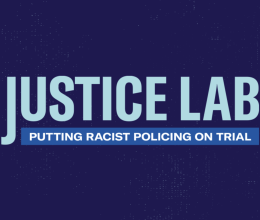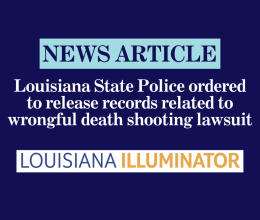NEW ORLEANS, LA — The ACLU of Louisiana has launched a new tool designed to improve public access to policing data across the state.
Titled “Policing in Louisiana, By the Facts,” this user-friendly platform includes more than 120,000 agency-level facts from over 330 law enforcement agencies, spanning six decades of policing history in Louisiana. This tool is part of the ACLU of Louisiana’s broader mission to use data as a catalyst for advocacy and public awareness regarding the criminal legal system in Louisiana.
“For far too long, data on police violence has been difficult to access, analyze, or even act upon,” said Alanah Odoms, executive director of ACLU of Louisiana. “This easily digestible tool is a critical step towards the level of transparency and accountability Louisiana residents deserve. Now, communities, members of the media, advocates, and policymakers from all over have a powerful resource to not only expose patterns of abuse from law enforcement but, most importantly, demand meaningful change from those sworn to protect and serve all people.”
Built on the foundation of the ACLU's Visualizing Police Violence in Louisiana dashboard released last year, this tool takes the next step in accountability by offering searchable, downloadable, and shareable agency-level data on police killings, misconduct allegations, officer demographics, and much more. This data is sourced from the Louisiana Law Enforcement Accountability Database, the FBI Crime Data Explorer, and Mapping Police Violence.
“We’re not presenting new data here, we’re just making it easier for people to find and use what’s already out there,” said Elijah Appelson, ACLU of Louisiana data analyst and project lead. “This tool is meant to help anyone – whether you’re a policymaker, a journalist, or a concerned resident – cut through the noise and get straight to the facts.”
In addition to compiling official records, the ACLU of Louisiana continues to collect firsthand reports of police misconduct and violence through its Police Misconduct Data Collection Form. These community-submitted reports help fill gaps in government transparency and inform public analysis.






